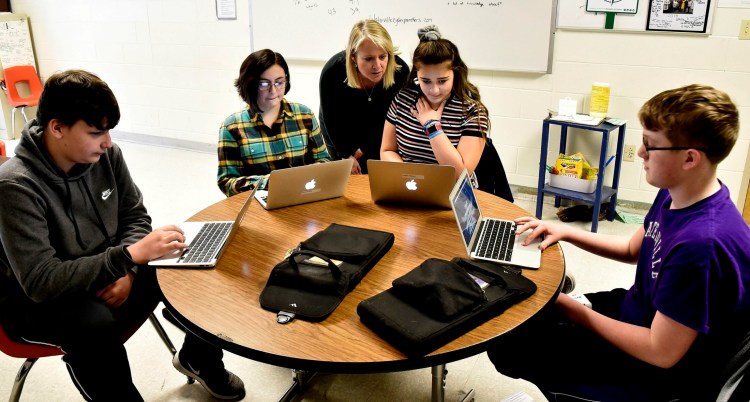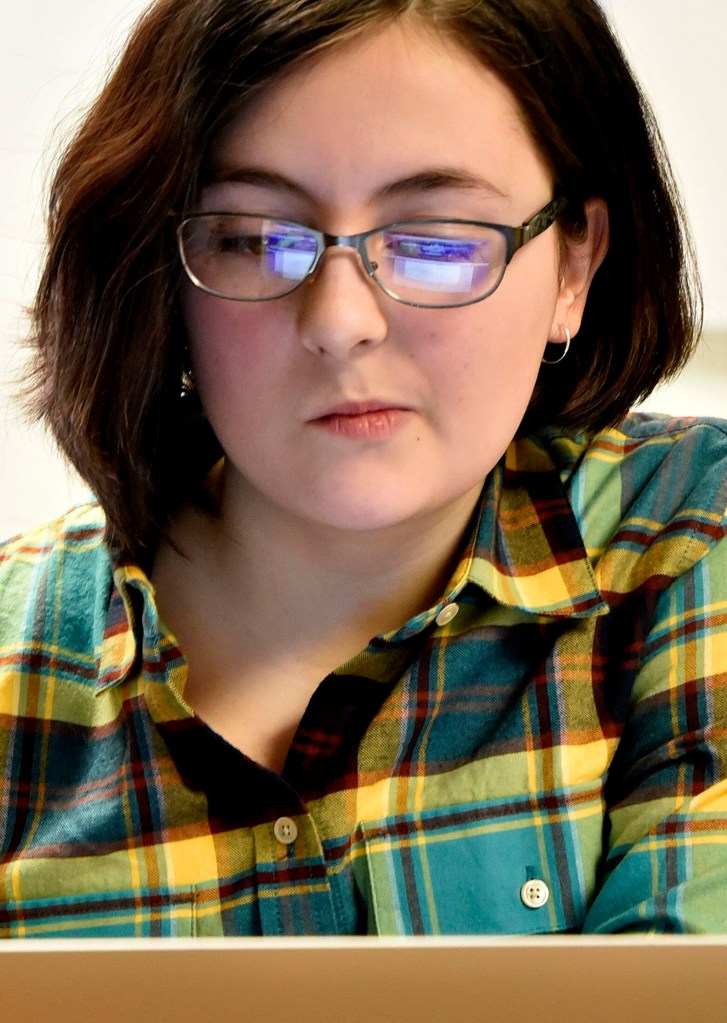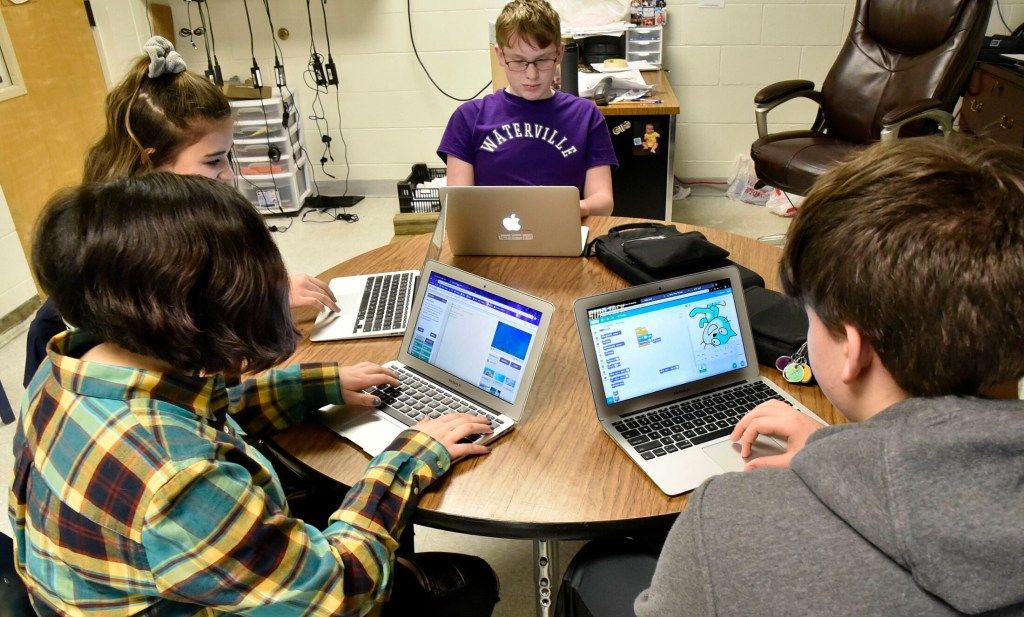WATERVILLE — When students at Waterville Junior High School go to sign up for their high school courses next week, they’ll have a new option that wasn’t part of the curriculum before: computer science.
The elective class, named Cyber Panthers, will include instruction in app development, virtual reality, artificial intelligence and other 21st-century fields not currently taught.
With the help of an $881,000 grant from the Harold Alfond Foundation, the course is being introduced for ninth-grade students at Waterville Senior High School in the fall with plans to grow the program as the students progress through high school.
The Boston-based Center for Curriculum Redesign, a nonprofit dedicated to improving education, is working on developing the course, which it hopes also will serve as a template for innovative computer science programming in schools across Maine and possibly the country.
“Computer science is really going to be in every field, and in order to be a 21st–century citizen and really be informed, students need to have these skills in place,” said Kim Quinn Hutchinson, executive director of the computer science pilot program. “So we’re super-excited to be able to partner with Waterville (Senior) High School and to run this pilot with freshmen next year.”
She and others say the program will help meet growing demand for computer science jobs in the workforce as well as prepare students for a variety of careers in which technology is growing.
According to the U.S. Department of Labor Bureau of Labor Statistics, computer and information technology occupations are projected to grow 13 percent nationally from 2016 to 2026, faster than the average for all occupations. The median wage for computing and information technology jobs was $84,580 in May 2017, compared to the median annual wage for all occupations of $37,690.
In Maine, more than 750 net jobs are expected to be added in computer and mathematical fields between 2016 and 2026, according to the Maine Department of Labor’s Center for Workforce Research and Information. The average hourly wage for such jobs ranges from $24.55 to $52.92.
The idea for the program in Waterville came about after a conversation Waterville Public Schools Superintendent Eric Haley said he had with Greg Powell, chairman of the Harold Alfond Foundation, in which Powell mentioned the Center for Curriculum Redesign was interested in running a pilot computer science program in Maine.
The conversation also came around the same time Haley said he heard a presentation from high school Principal Brian Laramee and Director of Guidance Lisa Hallen that indicated a high percentage of high school students are not engaged in the programs available to them.
“That scared the hell out of me,” Haley said. “I said, ‘This is another opportunity to engage kids.’ Because we’ve all seen the kid that has his hat on, the nerdy kid who is not 6-foot-8 and dribbling through his legs, but he’s the kid who knows a lot about technology. Those are the kids we need to engage.”
The one-credit course is still under development, but officials involved with the project said they are hopeful it will be more expansive and open to more students than the school’s current offerings.
Currently, a limited number of Waterville Senior High School juniors and seniors can take a dual enrollment course with the Mid-Maine Technical Center and Kennebec Valley Community College on information technology or Apple technology.
But Quinn Hutchinson and Charles Fadel, founder of CCR, said the material offered in the new class, partnerships in the community and the number of students the program will be available to will make it vastly different not just from Waterville’s current offerings but also from other programs across the state.
“There’s a universal need (for programs like this),” Fadel said. “Computer science is really, in essence, a language of sorts. The same way mathematics are used everywhere in our lives, computer science is increasingly being used. It doesn’t mean everyone has to have a computer science career, but even in the arts and humanities computer science has had an impact and increasingly so.”
The Maine Department of Education doesn’t keep track of how many schools offer classes in computer science, but spokeswoman Rachel Paling said many do offer related courses and many teachers incorporate aspects of computer science, such as robotics or coding, into their science or technology classes.
Many schools, like Waterville’s, also offer dual enrollment options with higher education institutions, opening up college-level computer science and coding classes to students, she said.
The Waterville pilot program now is structured to give students an overview of computer science including app development, virtual reality, artificial intelligence and cyber security. In future years, more specialized courses will be offered for 10th-, 11th- and 12th-graders.
Partnerships with higher education institutions such as Thomas College and Colby College and with local businesses also will be key, Quinn Hutchinson said, as the program seeks to set up mentors for students and have them complete internships.
There are no plans now to hire a full-time teacher, but rather the program is looking at hiring a specialist to work on the project and perhaps serve as the classroom instructor. They are also looking for a Waterville high school staff member to mentor students and are recruiting Colby and Thomas students who are studying computer science to serve as mentors.
The grant will cover all costs of the program for the first year, and Fadel said more funding could become available if it is successful.
Of the $881,000 allocated for the first year, he said, a majority of the money will go toward course development. Specialists in each of the six fields the course will cover — app development, virtual and augmented reality, gaming, artificial intelligence, digital humanities and cyber security/blockchain — will be employed to develop the curriculum. Other money will be spent on implementing the curriculum in the classroom and developing a way to bring what’s developed in Waterville to other classrooms.
“This isn’t just a computer coding boot camp you get off the internet,” Fadel said. “All of these things have never been done before. It’s really developing the content.”
Some of the funds probably will be used to buy equipment — probably laptops or tablets — and upgrade Waterville’s network to handle extra traffic.
If the pilot program continues a second year as intended, Fadel said, a larger potion of funding would go toward teachers, equipment and investments that would stay in the Waterville district. He said the cost for the district to maintain the program after development is over would be minimal and “maybe 5 percent” of the initial grant money.
Haley said he is also confident the district will be able to continue funding the program in the future.
“We have to start thinking, ‘What is our priority?’ as far as what kids get,” he said. “For instance, we used to teach home (economics). Now you seldom find home economics taught anymore. Shop class was very typically taught and is seldom taught anymore. Someone made priority decisions that this is more important than this right now. The world is changing.”
Rachel Ohm — 612-2368
Twitter: @rachel_ohm
Copy the Story LinkSend questions/comments to the editors.






Success. Please wait for the page to reload. If the page does not reload within 5 seconds, please refresh the page.
Enter your email and password to access comments.
Hi, to comment on stories you must . This profile is in addition to your subscription and website login.
Already have a commenting profile? .
Invalid username/password.
Please check your email to confirm and complete your registration.
Only subscribers are eligible to post comments. Please subscribe or login first for digital access. Here’s why.
Use the form below to reset your password. When you've submitted your account email, we will send an email with a reset code.